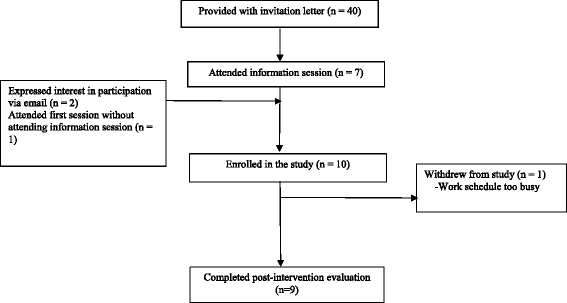Parents Working Together: development and feasibility trial of a workplace-based program for parents that incorporates general parenting and health behaviour messages
- PMID: 27832760
- PMCID: PMC5105296
- DOI: 10.1186/s12889-016-3817-z
Parents Working Together: development and feasibility trial of a workplace-based program for parents that incorporates general parenting and health behaviour messages
Abstract
Background: Parenting programs integrating general parenting and health behaviour messaging may be an effective childhood obesity prevention strategy. The current study explored workplaces as an alternate setting to deliver parenting programs.
Methods: This study involved two phases. The objective of the first phase was to explore interest in and preferred delivery mode of a workplace program that addresses general parenting and health behaviours. The objective of the second phase was to adapt and test the feasibility and acceptability of a pre-existing program that has been successfully run in community settings for parents in their workplace. To achieve the first objective, we conducted 9 individual or small group qualitative interviews with 11 workplace representatives involved in employee wellness/wellness programming from 8 different organizations across Southwestern Ontario. To achieve the second objective, we adapted a pre-existing program incorporating workplace representatives' suggestions to create Parents Working Together (PWT). We then tested the program using a pre/post uncontrolled feasibility trial with 9 employees of a large manufacturing company located in Guelph, Ontario.
Results: Results from the qualitative phase showed that a workplace parenting program that addresses general parenting and health behaviour messages is of interest to workplaces. Results from the feasibility trial suggest that PWT is feasible and well received by participants; attendance rates were high with 89 % of the participants attending 5 or more sessions and 44 % attending all 7 sessions offered. All participants stated they would recommend the program to co-workers. Just over half of our parent participants were male (55.6 %), which is a unique finding as the majority of existing parenting programs engage primarily mothers. Impact evaluation results suggest that changes in children's and parents' weight-related behaviours, as well as parents' reports of family interfering with work were in the desired direction post-intervention; however, confidence intervals substantially overlapped zero. Contrary to expectations, parents also reported an increase in restrictive feeding practices.
Conclusion: Our results indicate that a workplace-based program that addresses general parenting skills and weight-related behaviours may be a feasible way to engage and educate parents, including fathers. A full-scale trial is needed to examine the effectiveness of this approach.
Keywords: Childhood obesity prevention; Feasibility trial; Health behaviours; Parenting program; Workplace.
References
-
- Roberts KC, Shields M, de Groh M, Aziz A, Gilbert J. Overweight and obesity in children and adolescents: results from the 2009 to 2011 Canadian Health Measures Survey. In: Statistics Canada Health Reports, 23(3). 2012. http://www.statcan.gc.ca/pub/82-003-x/2012003/article/11706-eng.pdf. Accessed 24 May 2014. - PubMed
MeSH terms
LinkOut - more resources
Full Text Sources
Other Literature Sources
Medical


